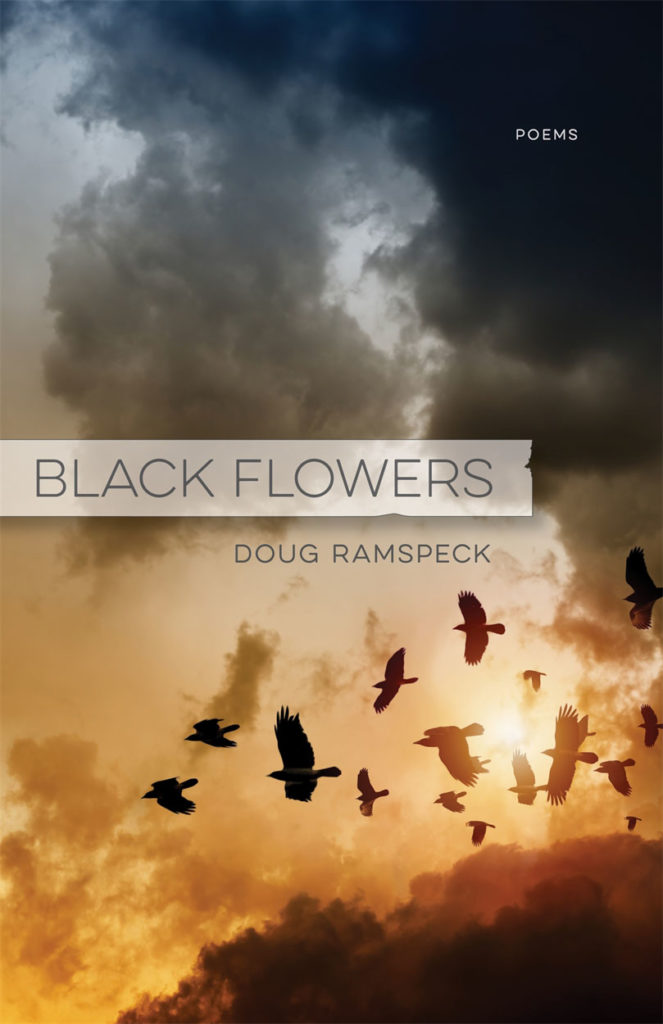Black Flowers
 Title: Black Flowers
Title: Black FlowersPublished by: LSU Press
Release Date: 2018
Genre: Poetry
ISBN13: 978-0-8071-6826-4
Buy the Book: LSU Press, Amazon, Barnes & Noble, IndieBound
Overview
In dark lyrical verse, Black Flowers follows a speaker from childhood into adulthood as he navigates the animistic world of crows, conjurings, and winter snows. By juxtaposing euphony and clear, startling imagery, Ramspeck’s novelistic new collection molds the landscape to reflect the speaker’s memories and the challenges of growing up in a dysfunctional family. In the tradition of William Wordsworth, Black Flowers brings the flourishes of the Romantics to the grit of present day. Finalist: UNT Rilke Prize.
Praise
“In his powerful new book of poems, Black Flowers, Doug Ramspeck forges a ghostic language of the natural order, less to domesticate the animal than to animate the human, to explore, via imaginative seeing, our instinctual birthright of grief, love, and ‘commotion / of need.’ Such is the gift here, the power of communion with the unknown, however wounded, or aloof, the cut grass ‘not an antidote to death / but its companion.’ A deeply beautiful book.”
—Bruce Bond
“A brooding spirit awakens the reader of Black Flowers into moments of residual brutality or loss skirted with primitive beauty—snow falling on a butchered horse, a drowned boy skipping stones. It is with equal parts care and abandon that Ramspeck figures a landscape inscribed in and by our being. He paints the field of a lengthening life with exquisite economy, in dusk and mud and snow, the sentiments illuminating that field both loving and feral.”
—Paula Closson Buck
“Doug Ramspeck’s latest book displays a somber, introspective beauty . . . Helen Vendler in Last Looks, Last Books, describes Robert Lowell’s poems in Day by Day as tending ‘to remain enclosed within the past that they described.’ This is true, as well, for Ramspeck’s brilliant visual images here. The poet’s portrayal of the father is vivid and moving. Moving, too, is the portrayal of a tender marriage—an early miscarriage, later, a son—a shared, yet solitary life of house and vegetable garden set amid rural landscapes . . .”
—Zara Raab, Poet Lore (vol. 14, nos. 1&2)
Sample Poem
Winter Fever
My father, in the hard gray
of winter, is kneeling again
and sliding the knife
from sternum to crotch,
blood welling like a dark liquid
oozing from a secret burrow,
intestines pouring onto grass.
Dead is dead, he always claimed,
adding that we might as well
toss him someday in a landfill
for all he cared, leave him
to feed the buzzards we saw
some days circling beneath
the stillness of low-slung clouds,
as though an end were little more
than a gathering in air, a few
serrated wings, a January wind slowing
then stopping in desiccated weeds.
The dead deer watches me
watching my father clean his knife
by wiping it against his jeans.
He told me once he planned
to die alone, to crawl into
the undergrowth beyond the barn
and listen to his breaths
grow more and more labored
then disappear, the way the body—
freed of the responsibilities
of common day—slowly devolves
into the perfection of pale bone.
Earlier I had watched him
carrying the deer on his shoulders,
four legs wrapped around his neck,
the way, when I was younger,
he would ferry me across
the living room then up the stairs.